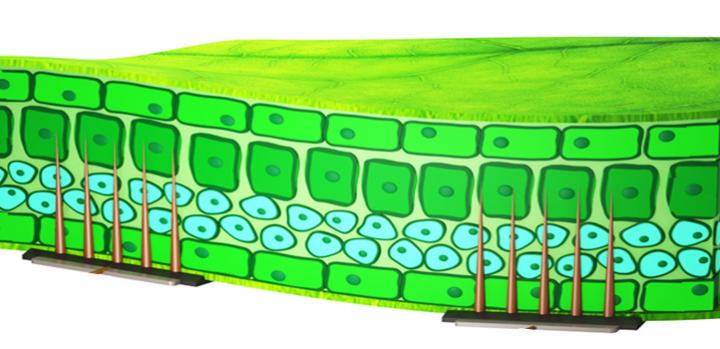Saudi Arabia
June 21, 2021
A method for making ultrathin sensors for monitoring the health of crops could help farmers grow more food without putting extra demands on the land.
Intensive agriculture is already contributing to widespread biodiversity loss and climate change, yet growing populations continue to put pressure on farmers to produce more food. The challenge now lies in increasing agricultural output without clearing more land or applying excessive fertilizers. Precision farming is a promising solution that involves real-time monitoring of plant needs and responding to them with just the right amount of water, light or nutrients.
 The team is making silicone molds that can be used to manufacture ultrathin microneedles for sustainable farming. - Credit: © 2021 KAUST
The team is making silicone molds that can be used to manufacture ultrathin microneedles for sustainable farming. - Credit: © 2021 KAUST
"Precision farming typically relies on soil-based sensors or drones fitted with special cameras," says Ph.D. student Abdullah Bukhamsin, "but they cannot capture changes in the plant early enough to enable intervention." Previous research has shown that measuring bioimpedance -- how easily an electrical current passes through organic tissues -- can reveal physiological information about a plant, from its nitrogen and water content to the presence of fungal infections or metal contaminants.
Plants, however, have a thick outer layer that blocks electrical signals, and bioimpedance sensors must pierce the surface without affecting the properties they wish to measure. It remains difficult to manufacture instruments tiny and thin enough to do this job.
Now, an efficient method for making silicone molds that can be used to manufacture such ultrathin microneedles has been developed by Bukhamsin and a multidisciplinary team of KAUST researchers led by Khaled Salama. These delicate needles can be released intact by submerging the mold in trichloromethane. "The swelling causes the mold to expand ever so slightly, thereby gently pushing the trapped structure out," says Bukhamsin.
The reusable molds could enable cost-effective, mass-production of microneedles in various plant-friendly polymers. When the team tested their microneedle on an Arabidopsis thaliana leaf, the puncture hole sealed within four days and the plant was not harmed.
"In our tests, the impedance measurements were closely related to how much light a plant has been exposed to and how dehydrated it is," says Bukhamsin. "This bioimpedance data could be used alongside shading technologies and an irrigation system that responds to the actual needs of the crops, thereby avoiding overwatering." Unexpectedly, this relationship was almost identical in other crops, including date palm and barley. "This is promising as it highlights the versatility of the approach and its potential applicability across different plants," he adds.
"Next, we will explore what other environmental factors affect the impedance of plants," says Salama, "and how we can use electrochemical measurements to quantify hormone levels in different plant species." Such detailed data could feed into even more finely tuned precision farming in the future.